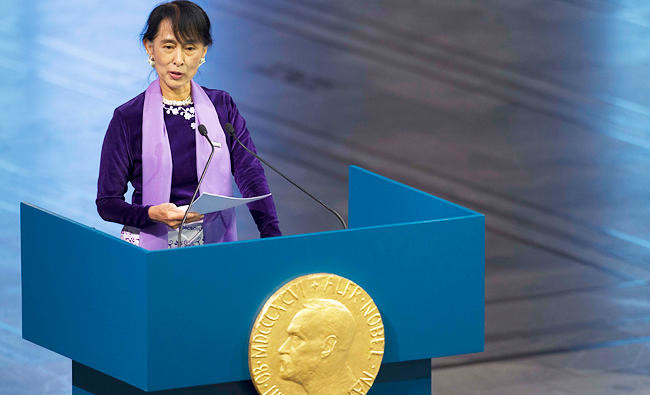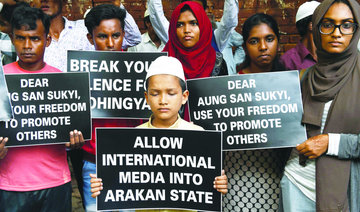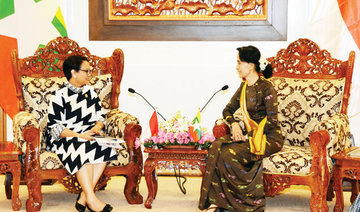COPENHAGEN: The organization that oversees the Nobel Peace Prize said Friday the 1991 prize awarded to Myanmar’s Aung Sang Suu Kyi cannot be revoked.
Olav Njolstad, head of the Norwegian Nobel Institute said in an email to The Associated Press that neither the will of prize founder Alfred Nobel nor the Nobel Foundation’s rules provide for the possibility of withdrawing the honor from laureates.
“It is not possible to strip a Nobel Peace Prize laureate of his or her award once bestowed,” Njolstad wrote. “None of the prize awarding committees in Stockholm and Oslo has ever considered revoking a prize after it has been awarded.”
An online petition signed by more than 386,000 people on Change.org is calling for Suu Kyi to be stripped of her Peace Prize over the persecution of Myanmar’s Rohingya Muslim minority.
Suu Kyi received the award for “her non-violent struggle for democracy and human rights” while standing up against military rulers.
She became the country’s de facto leader after Myanmar held its first free election in 2012 and she led her party to a landslide victory.
On Thursday, former South African archbishop Desmond Tutu urged her to intervene to stop the persecution of the Rohingya. In an open letter, he told his fellow Nobel Peace Prize winner that it is “incongruous for a symbol of righteousness” to lead a country where violence against the Rohingya is being carried out.
Rohingya have described large-scale violence perpetrated by Myanmar troops and Buddhist mobs — setting fire to their homes, spraying bullets indiscriminately and ordering them to leave or be killed.
Suu Kyi has dismissed the Rohingya crisis as a misinformation campaign.
Suu Kyi can not be stripped of prize, says Nobel institute
Suu Kyi can not be stripped of prize, says Nobel institute

Pakistan envoy identifies textiles, agriculture as key sectors to focus in exports to Saudi Arabia

- Pakistan and Saudi Arabia are close regional partners, and the Kingdom remains the largest source of remittances to the South Asian country
- Ambassador Ahmad Farooq stresses need to improve vocational training of Pakistani workers to meet standards required for mega Saudi projects
ISLAMABAD: Pakistan Ambassador to Saudi Arabia Ahmad Farooq on Wednesday identified textiles, agriculture and red meat as key sectors for Pakistani businesses to focus on in order to increase the country’s exports to the Kingdom.
Farooq identified the key sectors during his visit to the Karachi Chambers of Commerce and Industry (KCCI) on Wednesday, where he met with leading Pakistani businesspersons and industrialists, according to the KCCI.
The ambassador highlighted that Pakistan’s exports to the Kingdom had registered a 40 percent increase during 2023-24, with the information technology (IT) sector witnessing an impressive 50 percent growth.
Pakistan and Saudi Arabia last year signed 34 agreements worth nearly $3 billion, of which, memorandums of understanding (MoUs) worth $700 million have already entered the implementation stage, according to Farooq.
“We want large businesses to connect with local distributors in Saudi Arabia to facilitate exports,” he was quoted as saying by the KCCI. “A list of key exporters in these sectors should be shared with the [Pakistani] embassy so we can work together to strengthen trade relations.”
Farooq said Pakistani textile, agriculture and meat (beef and mutton) products had already seen a “remarkable growth” in the Saudi market, adding that the Kingdom offers vast opportunities for Pakistani businesses.
“The purpose of my visit is to discuss business opportunities with the Karachi business community and update them on how Pakistan’s embassy can support them in accessing the Saudi market,” he added.
Speaking about the rising demand for skilled manpower, the Pakistani envoy said more than 3 million Pakistanis were currently living in the Kingdom, however, 97 percent of them were “blue-collar workers.”
Saudi Arabia is currently developing its public service sectors such as health, education, infrastructure, recreation and tourism as part of a strategic framework, Vision 2030, which aims to diversify the Kingdom’s economy beyond oil. The
Kingdom’s ambitious plan coincides with Pakistan’s efforts to boost trade and foreign investment to revive its fragile economy.
“Saudi authorities have advised us to improve vocational training for Pakistani workers to meet the standards required for upcoming projects,” Ambassador Farooq said, stressing the need to enhance training programs to equip these workers with modern technical skills.
Pakistan and Saudi Arabia are close regional partners, and the Kingdom remains the largest source of remittances to the South Asian country, contributing $7.5 billion in the last fiscal year (July 2023-June 2024), according to KCCI President Jawed Bilwani.
Saudi Arabia has also regularly provided Pakistan oil on deferred payments and offered direct financial support to help shore up Pakistan’s forex reserves.
KCCI Senior Vice President Zia-ul-Arfeen stressed the need to enhance joint ventures between the two countries, urging Islamabad to further improve the ease of doing business for foreign investors.
“Saudi investors should consider Pakistan for investments, particularly in the food sector,” he added.
Kingdom Centre screen: an icon of outdoor advertising

Kingdom Centre, a symbol of Riyadh and one of its most iconic landmarks, will feature a state-of-the-art screen that redefines innovation in outdoor advertising. This centerpiece elevates Saudi Arabia’s status as a global hub for creativity and advertising. The project delivers a groundbreaking advertising experience, capturing visitors’ attention to the capital and aligning with a strategic vision to provide cutting-edge platforms for local and international markets.
Hassan Zaini, acting CEO of Rotana Signs, said: “The launch of this screen is a significant milestone in delivering an unparalleled advertising experience in Saudi Arabia. It represents the culmination of our efforts to achieve excellence in this sector.”
This achievement results from a strategic collaboration combining technical expertise with media strength.
Nizar Nagro, chairman of Rotana Signs, said: “This project showcases the ability of Saudi media to deliver innovative solutions that captivate audiences and drive brand engagement. It is a testament to the power of united expertise in pursuing a shared vision.”
The screen is a fully integrated advertising platform, merging advanced technology with aesthetic design to enhance the urban landscape. Zaini added: “We take pride in leveraging modern technology to deliver a project that reflects Saudi Arabia’s ambition for global leadership in big format advertising, redefining the standards of outdoor advertising.”
The project provides audiences with a visually stunning experience while offering advertisers an innovative way to connect with their target markets. Nagro said: “This achievement redefines the concept of outdoor advertising in the region and paves the way for even more ambitious projects in the future.”
The launch of the Kingdom Centre screen marks the beginning of a series of advertising initiatives to establish Saudi Arabia as a creative hub for media and advertising. By recognizing the media’s role as a powerful soft force, this partnership is poised to make a significant market impact and contribute to the realization of Saudi Vision 2030.
Italian clothing brand intimissimi opens first Saudi store

intimissimi, an Italian brand synonymous with elegance and romance, has opened doors to its first Saudi store at Panorama Mall in Riyadh. This launch marks a milestone for the brand, introducing its world-renowned sophistication, classic Italian flair, and unsurpassed workmanship to the Kingdom for the first time.
“The flagship store is more than just a shopping destination — it is a celebration of femininity and style,” a statement said. Designed with intimissimi’s standard attention to detail, the store provides an immersive shopping experience in which consumers can browse luxurious products in a welcoming, easy-to-navigate setting. The store exudes the essence of Italian charm, giving women across the Kingdom a taste of the Italian elegance that has captured hearts all over the world.
“Our entry into Saudi Arabia marks an exciting milestone for intimissimi as we continue to expand our presence in the Middle East. This step reflects the Kingdom’s increasing demand for luxury apparel and its dynamic, style-conscious community. We are thrilled to bring our elegant tradition to Saudi Arabia and look forward to becoming a cherished part of Riyadh’s vibrant fashion scene,” said Tamara Jaber, brand manager at intimissimi.
To celebrate the grand opening, intimissimi at Panorama Mall hosted an exclusive event, which drew a distinguished crowd, including some of Saudi Arabia’s top influencers and fashion enthusiasts. Guests were invited to explore the new store and its collections, enjoying an evening filled with glamor and sophistication. The event featured special promotions, and exclusive surprises, creating a truly unforgettable experience that marked the brand’s debut in the Kingdom.
intimissimi’s collections, which include luxurious intimates, elevated knitwear, and comfy nightwear, will now be available for shoppers in Riyadh. Founded in 1996, the brand combines Italian heritage with current designs to empower women with comfort and beauty. It is available in 53 countries with 1,719 stores worldwide.
Saudi Arabia’s real GDP grows 4.4% in Q4: GASTAT

RIYADH: Saudi Arabia’s real gross domestic product expanded by 4.4 percent in the fourth quarter of 2024 compared to the same period in 2023, marking its highest growth in two years, official data showed.
According to flash estimates from the General Authority for Statistics, the Kingdom’s non-oil activities grew by 4.6 percent year on year in the fourth quarter, reflecting ongoing efforts to diversify the economy.
The report also noted that oil activities rose by 3.4 percent in the fourth quarter compared to the same period in 2023, while government activities expanded by 2.2 percent.
Saudi Arabia’s GDP growth aligns with the broader Middle East trend, where countries are steadily advancing economic diversification. The UAE’s central bank projects 4 percent GDP growth in 2024, while Bahrain and Qatar reported year-on-year expansions of 2.1 percent and 2 percent, respectively, in the third quarter. Qatar’s full-year GDP grew by 1.7 percent, driven by a 1.9 percent rise in non-hydrocarbon activities.
“The results also showed that seasonally adjusted real GDP increased by 0.3 percent in the fourth quarter of 2024 compared to the third quarter of the same year,” GASTAT stated.
Strengthening the non-oil sector remains a key goal under Saudi Arabia’s Vision 2030 as the Kingdom continues efforts to reduce its dependence on oil revenues and drive sustainable economic growth.Compared to the third quarter, non-oil activities in the Kingdom grew by 1.3 percent, while government activities rose by 0.3 percent. However, oil activities witnessed a quarterly decline of 1.5 percent.
For the full year 2024, Saudi Arabia’s GDP expanded by 1.3 percent compared to 2023. This increase was primarily driven by a 4.3 percent rise in non-oil activities, underscoring the Kingdom’s focus on economic diversification.
Government activities recorded a 2.6 percent annual increase, while oil activities contracted by 4.5 percent due to OPEC+ output cuts, which have impacted production levels.
Earlier this month, the International Monetary Fund projected that Saudi Arabia’s economy will grow by 3.3 percent in 2025 and 4.1 percent in 2026. These projections reflect shifts in the global economic landscape, with oil production adjustments playing a key role in influencing near-term growth expectations.
A December report from Mastercard Economics also highlighted the robust expansion of Saudi Arabia’s non-oil sector. The analysis forecast that the Kingdom’s GDP will grow by 3.7 percent year on year in 2025, largely driven by increased non-oil activities.
The Mastercard report added that economic diversification efforts will remain a priority in 2025, with the government leveraging its strong fiscal position to finance infrastructure development and new investment opportunities.
KSrelief delivers dates to Sudan and Burkina Faso

RIYADH: The Kingdom’s aid agency KSrelief has distributed dates in Sudan and Burkina Faso, the Saudi Press Agency reported on Thursday.
In Sudan 700 cartons of dates were distributed, benefiting 4,020 individuals living in Wad Madani.
The aid agency also gifted 50 tonnes of dates to Burkina Faso as a part of their relief programs.
















